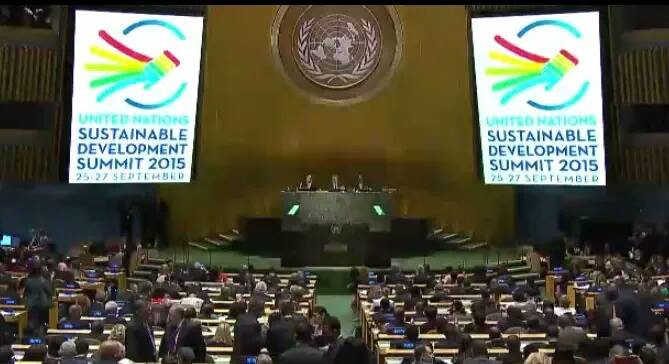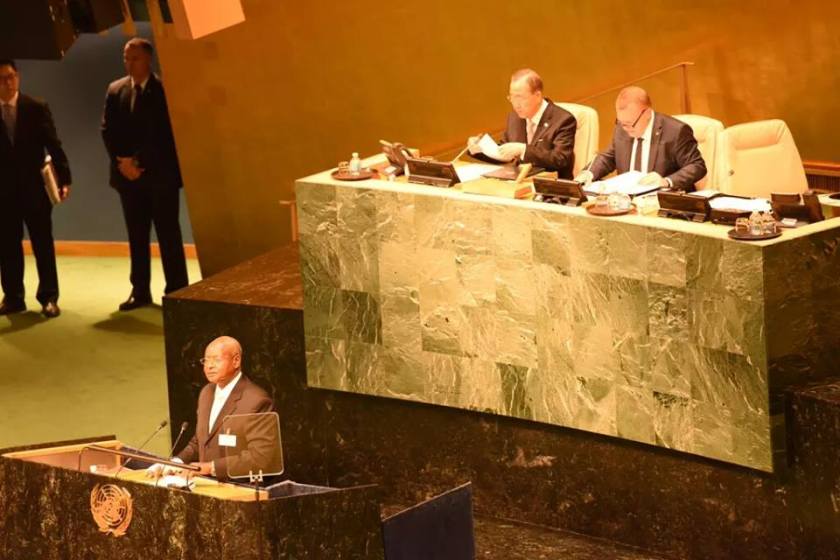New York 25 September, 2015
Your Excellencies Heads of State and Government,
Your Excellency Lars Løkke Rasmussen, Prime Minister of Denmark and co-chair of the Summit,
Mr. Secretary-General,
President of the General Assembly,
Honourable Ministers,
Distinguished participants,
Ladies and Gentlemen,
I am pleased to co-chair this important Summit as we gather as a community of nations to adopt a new development agenda that will guide our development efforts for the next 15 years.
This historic Summit is the culmination of months of tireless efforts and unprecedented commitment by Member States and stakeholders to formulate a universal, inclusive and transformative development agenda.
I would like to pay tribute to H.E. Sam Kutesa for his leadership and accomplishments as President of the 69th Session of the General Assembly and thank all of you for supporting Uganda in that responsibility.
I also congratulate and convey appreciation to the President of the 70th Session, H.E. Mogens Lykketoft and the Secretary-General, H.E. Ban Ki-moon for their leadership.
Today heralds the dawn of a new era in our collective efforts towards eradicating poverty, improving livelihoods of people everywhere, transforming economies and protecting our planet.
Together, we are sending a powerful message to people in every village, every city and every nation worldwide ─ that we are committed to taking bold steps to change their lives, for the better.
The 2030 Agenda for Sustainable Development, which we will adopt today, is ambitious in its scope and breadth. In the 17 Sustainable Development Goals (SDGs), the social, economic and environmental dimensions of sustainable development are addressed in an integrated way. The agenda also carries forward the unfinished business of the Millennium Development Goals (MDGs).
Over the last fifteen years, we have attained significant achievements through implementing the MDGs. Globally, more than one billion people have been lifted from extreme poverty and improvements have been made in access to education, health, water and sanitation, advancing gender equality and women’s empowerment.
In Uganda, we have been able to reduce the percentage of people living in extreme poverty from 56% in 2000 to 19% currently. We have also attained universal primary education, promoted gender equality and empowerment of women and continue to reduce child and maternal mortality. From our experience, it has been clear that to sustainably achieve the MDGs we must have socio-economic transformation.
It is, therefore, refreshing that in the successor framework, the SDGs, key drivers of economic growth, have been duly prioritized. These include infrastructure development especially energy, transport and ICT; industrialization and value-addition; human resource development; improving market access and greater participation of the private sector.
While the SDGs will be universally applicable, we also recognize national circumstances, different levels of development and the needs of countries in special situations, particularly the Least Developed Countries (LDCs), Landlocked Developing Countries (LLDCs), Small Island Developing States (SIDS) and African countries.
Taking urgent action to combat climate change and its severe impacts is also prioritised in the new agenda. We should redouble efforts towards reaching an ambitious legally-binding agreement on climate change in Paris in December that promotes the achievement of sustainable development, while protecting the planet.
The new agenda also rightly underscores the important linkages between development, peace and security and human rights. We have to intensify efforts to combat transnational crime, terrorism and the rise of radicalization and violent extremism around the world.
We should reject pseudo ─ ideologies that manipulate identity (by promoting sectarianism of religion and communities) and eclipse the legitimate interests of peoples through investment and trade. Where identity issues are legitimate, they should be expeditiously handled.

Excellencies,
We should all be proud of what has been accomplished so far as we usher in this new development agenda. However, the critical next step will be to ensure its successful implementation on the ground.
In this context, integrating the SDGs into our respective national and regional development plans, mobilizing adequate financial resources, technology development and transfer as well as capacity building will be critical.
We have to ensure full implementation of the comprehensive framework for financing sustainable development, which we adopted in the Addis Ababa Action Agenda to support achievement of the goals and targets of Agenda 2030.
One of the major challenges many developing countries continue to face is accessing affordable long-term financing for critical infrastructure projects.
In this regard, it will be vital to promptly establish and operationalize the proposed new forum to bridge the infrastructure gap and complement existing initiatives and multilateral mechanisms to facilitate access to long-term financing at concessional and affordable rates.
The efforts of developing countries to improve domestic resource mobilization, boost economic growth and address major challenges such as unemployment should be supported by development partners as well as international financial institutions and regional development banks. We also need to do more to promote Micro, Small and Medium Enterprises (MSMEs), support entrepreneurship especially for women and youth and enhance the contribution of the private sector and other stakeholders to sustainable development. Through prioritization, the Least Developed Countries (LDCs) themselves can also contribute to their own infrastructure development.
In order to build effective, inclusive and accountable institutions at all levels, we have to ensure that the voices of developing countries and regions are heard and that they are treated as equal partners in multilateral decision-making. At the international level, we need urgent reform of the United Nations ─ particularly the Security Council ─ and other multilateral institutions to reflect the current geo-political realities.
We need a renewed global partnership for development in which all the commitments made, including on Overseas Development Assistance (ODA), trade and investment are fulfilled.
While the Agenda represents the collective aspirations of all peoples, its success will hinge on its ability to reduce inequalities and improve the lives of the most vulnerable among us, including women, children, the elderly and persons with disabilities.
After months of intense negotiations and steadfast commitment, we have before us an Agenda that represents our best opportunity to transform our world.
We have heard the voices of people spanning the globe; from eager children asking for access to a quality education to young women seeking better maternal health; from rural villagers whose farmlands have been ravaged by droughts to the coastal fishermen on Small Island States who fear their entire existence will soon be swallowed up by rising sea levels.
We continue to witness the influx of refugees and migrants into Europe from Africa and the Middle East, which is partly caused by conflict and lack of economic opportunities.
These voices may speak many language and dialects, but in the end their message is the same ─ please help us to live happier, more prosperous lives, while also protecting the planet for our children and grandchildren.
After adoption of this Agenda, it is incumbent upon us all to take the development aspirations laid out in this document and turn them into reality on the ground; for our people, our communities and our nations. This agenda will create global prosperity different from the past arrangements of prosperity for some through parasitism and misery and under-development for others.
I thank you for your attention.










